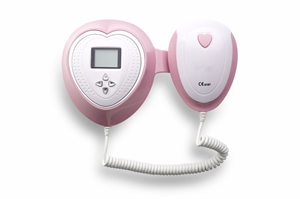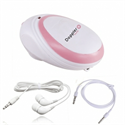What is a Fetal Doppler?
A fetal Doppler is a device used to monitor a baby’s heart rate throughout pregnancy. The device is non-invasive, which makes it a good safety choice for all pregnant mothers. The heart rate is measured by the Doppler effect, emitting and receiving ultrasonic sound waves and monitoring the shift in pitch of the sound waves. Every returning sound wave is measured as the sound of the heartbeat heard through the speakers on the Doppler.
Ideal Times to Search for a Heartbeat
An embyro’s heart begins beating around 22 days after conception, but it takes much longer for doctors and parents to be able to listen to the heart beat. Between the 9th to 12th week of pregnancy, most fetal dopplers are able to pick up the sound of the heartbeat. Some heartbeats may be hard to find, and this is perfectly normal. Just be patient and try around more areas of the belly, eventually you will hear it!
About the Angelsounds Pro Edition Fetal Doppler
This Pro Edition Angelsounds Baby Heart Monitor (model JPD-100B) is as good as the equipment you find at your obstetrician’s office, but is simple enough to use at home. The mother (or father) just press the probe of the device against the abdomen, turn on the speaker and then listen to the baby’s heart beating. It also has a headphone jack so that the parents can attach a recording cable from the fetal heart monitor to their computer to record the baby’s heartbeat at a WAV or MP3 file, which if great to save for memories as well as a wonderful gift to send to family and friends.
Fetal Heart Rates
Starting at week 5 the fetal heart rate accelerates by 3.3 bpm per day for the next month.
The fetal heart begins to beat at approximately the same rate as the mother’s, which is typically 80 to 85 bpm. The approximate fetal heart rate for weeks 5 to 9 (assuming a starting rate of 80):
- Week 5 starts at 80 and ends at 103 bpm
- Week 6 starts at 103 and ends at 126 bpm
- Week 7 starts at 126 and ends at 149 bpm
- Week 8 starts at 149 and ends at 172 bpm
- At week 9 the fetal heartbeat tends to beat within a range of 155 to 195 bpm. At this point, the fetal heart rate begins to decrease, and generally falls within the range of 120 to 160 bpm by week 12.
Questions & Answers
Q: Is Fetal Doppler safe to use?
A: Constant testing is done by U.S. governmental agencies and no adverse risks to the baby or mother have been detected. The Mayo clinic states that “In 30 years of regular use, no adverse effects have ever been demonstrated from ultrasound testing. Research has been done investigating both the noise produced in the utero and the heat produced by ultrasound, and no problems have ever been detected from it’s use in exposed babies. There is no reason to feel uncomfortable about the use of ultrasound during pregnancy and there are great benefits to using it.”
Q: When can I start using Fetal Doppler at home to detect fetus heartbeat?
A: The models provided by Best Medical Direct can detect fetus heartbeat from 12 weeks or above.
Q: Do I need a special lotion or ultrasound gel for the Fetal Doppler?
A: No. The models provided by Best Medical Direct could be used WITHOUT lotion or ultrasound gel. If you feel more comfortable using gels, baby oil is a good substitute of gels.
Q: What if I can’t find the baby’s heartbeat?
A: Perhaps the baby is positioned in a way that prevents the Fetal Doppler from detecting the heartbeat so you should wait a while and try again.
Q: How do I distinguish my heartbeat from the baby’s?
A: Your baby’s heartbeat is much faster than your own. Sometimes it sounds like the fast “clippety-clop” of a galloping horse. You can distinguish your heartbeat from your baby’s based on the heart rate, yours being the slower one. When using the Fetal Doppler, you may also hear a “swishing” sound, this is the sound of your blood flow.
Q: How many heartbeats per minute will I hear?
A: The baby’s heartbeat is usually between 120 and 160 beats per minute, much faster than your own.


















 with LCD Monitor.jpg)
 with LCD Monitor (2).jpg)


